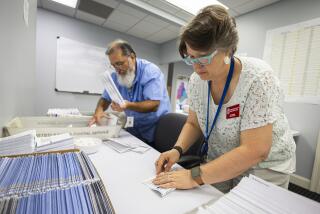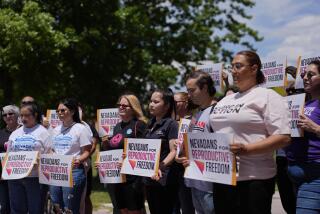States may vote earlier
- Share via
WASHINGTON — Tired of being bystanders as small states get the biggest say in choosing a presidential candidate, lawmakers in California and Florida are eyeing earlier primary dates for the 2008 election that would force contenders to campaign in their states.
The idea is drawing bipartisan support from lawmakers in Sacramento and Tallahassee and is being watched closely by strategists for potential candidates -- some of whom have already begun building campaign teams in the traditional early-voting states of Iowa and New Hampshire.
Such a change would transform the nomination battles in both parties, forcing candidates to compete in some of the country’s priciest media markets while diverting their attention from the chicken-dinner circuit in Davenport, Manchester and other small towns and cities where old-style retail politics is king.
Well-funded front-runners on both sides -- such as Sens. Hillary Rodham Clinton (D-N.Y.) and John McCain (R-Ariz.) -- would likely benefit, while lesser-known contenders with slimmer bank accounts would find their tasks even more daunting.
California and Florida held their 2004 Democratic primaries in March -- less than two months after the Iowa caucuses and the New Hampshire primary -- but by then Sen. John F. Kerry had already secured the nomination. California is scheduled to hold its 2008 primary in June, but lawmakers want to move it closer to the January votes in Iowa and New Hampshire.
Considering California’s size, “we should be more than an afterthought in the selection of the next president,” said Steve Maviglio, a spokesman for Assembly Speaker Fabian Nunez (D-Los Angeles).
Florida’s incoming state House speaker, Republican Marco Rubio, pitched the idea Thursday in Washington, saying he had already discussed it with several potential 2008 candidates on the GOP side.
He noted that candidates would be exposed to a wide range of issues in Florida, whose diverse population is concerned about immigration, Israel, Latin America and the environment -- and that since 2000, when the Florida vote decided the election, both sides see his state as a crucial battleground.
“The party should want it, because neither of the nominees can win if they can’t win Florida,” Rubio said. “In terms of the big national issues ... Florida is at the forefront of all of them, much more so than Iowa and New Hampshire.”
The proposals are likely to rankle officials in both parties, which prohibit most states from holding their primaries earlier than the first week of February.
The Democratic National Committee’s newly approved calendar has added Nevada and South Carolina to the so-called “preseason” in January, putting states with heavy Latino and African American populations into the mix. Iowa and New Hampshire are heavily white.
Critics say that additional “front-loading” of primaries, particularly by big states, would force candidates to raise millions for television ads rather than campaigning in union halls, community centers and church basements.
“Everyone is looking for their place in the sun, but as a result nobody would get their place in the sun,” said Rep. David E. Price (D-N.C.), who headed a commission that studied the primary system. “The whole thing would be over before it begins.”
More to Read
Get the L.A. Times Politics newsletter
Deeply reported insights into legislation, politics and policy from Sacramento, Washington and beyond. In your inbox twice per week.
You may occasionally receive promotional content from the Los Angeles Times.










